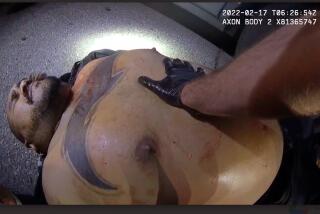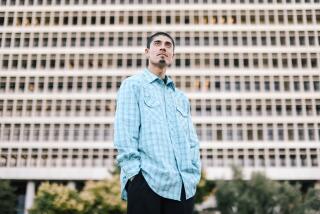From the archives: Blackwater guards are to be arraigned
- Share via
BAGHDAD — Ask attorney Hassan Jabbar Salman what should happen to five Blackwater Worldwide guards accused of killing 17 unarmed Iraqis and wounding 20 others, including himself, and his answer is simple: They should be hanged.
Salman watched helplessly from his car on Sept. 16, 2007, as Blackwater’s Raven 23 convoy opened fire in Baghdad’s crowded Nisoor Square, firing automatic weapons and rocket-propelled grenade launchers. Four bullets struck his back, one piercing his left lung. Another bullet remains lodged in his arm. His injuries were so severe that an Iraqi police officer initially told his family he was dead.
“The justice is that they must be executed,” Salman said. “They opened fire on innocent, unarmed people.”
His choice of words reflects the bitterness that Salman and other victims of the 2007 shootings still feel. So far, their quest for justice has been frustrated.
But today, the five guards who were indicted last month by a U.S. federal grand jury are scheduled for arraignment in Washington, each facing 14 counts of voluntary manslaughter and 20 counts of attempted manslaughter. They are also charged with using a machine gun to commit a crime of violence, which carries a 30-year minimum sentence. A sixth guard negotiated a plea agreement in exchange for offering testimony against the others.
The high-profile incident damaged Iraqi-U.S. relations and led to widespread calls for reform of private security contractors, who at the time operated free from the threat of prosecution by Iraqi authorities. As the two countries negotiated the security agreement that outlines the withdrawal of U.S. troops by the end of 2011, Iraqis demanded that the pact remove private security contractors’ exemption from Iraqi law, a change that took effect Jan. 1.
The North Carolina-based Blackwater and attorneys for the accused guards have defended the incident, saying the men were fired upon by suspected insurgents. A Blackwater spokesperson declined to comment on the case, but the company has stated that its guards are highly trained professionals forced to make split-second decisions in hostile environments. And the Associated Press reported last month that copies of Blackwater radio logs it had obtained showed the guards reported taking “small-arms fire.”
But the sixth guard, Jeremy P. Ridgeway, told prosecutors that the gunfire from Blackwater guards was unprovoked and without warning and that the victims did not appear to be armed.
Salman, who has physical problems connected with his wounds and suffers from nightmares, said he is dedicated to ensuring that the men are punished. He spoke in Geneva at a human rights convention, keeps in regular contact with his U.S.-based attorney and may testify at the trial, if necessary.
He’s just one of several Nisoor Square victims willing to testify. Baraa Sadoon Ismail said the injuries he suffered in the shooting changed his life completely.
“Just imagine having two bullets and 60 pieces of shrapnel in your body,” Ismail said. “The person who shot me was a very short distance from me. When he pointed his weapon at me, I raised both hands up. But he shot me! My eyes were at his eyes when he shot me. I will never forget these moments.”
Although Salman and Ismail have the opportunity to face their alleged assailants in court, victims of other past shootings involving private security contractors fear they will never see justice. So far, only Blackwater guards in the Nisoor Square shooting have been indicted. Federal officials have said they are also investigating a Christmas Eve 2006 incident allegedly involving an intoxicated Blackwater contractor who shot and killed a bodyguard to one of Iraq’s vice presidents.
Scott Horton, a military law expert and visiting professor at the Hofstra University School of Law, said any case involving private security guards’ conduct in Iraq is complicated by jurisdictional issues.
“It’s going to be the first time the Justice Department has brought a case of this sort, and we’ve got a number of legal theories involved here that are being taken for a first-time run,” Horton said. “It’s far from a plain-vanilla case.”
The jurisdictional problems, as well as lack of criminal investigation at the time of other reported incidents, make it highly unlikely that suspects in those cases will be prosecuted in U.S. courts, Horton said.
“It’s almost impossible to go back a year or two and discover this stuff,” Horton said, adding that the Nisoor Square incident resulted in prosecution only after intense pressure from the Iraqi government.
Suhair Shakir knows that the Blackwater guard she says fatally shot her sister will probably never be charged. Suhad Shakir, who worked for the U.S. military, was shot while sitting in her car on Feb. 4, 2007. Witnesses said Suhad Shakir had pulled over to let a Blackwater convoy pass when a guard tossed water bottles at her car, a method used by security contractors to warn away vehicles. A few minutes later, a guard inside an armored white car opened fire, witnesses said.
“She was shot 11 times,” Suhair Shakir said. “One bullet penetrated her left ear, and her brain spilled out. Nobody rescued her; nobody cared.”
Horton said Iraqis seeking justice may have another option. The previous accord governing private security contractors in Iraq noted that they had immunity from Iraqi criminal prosecution unless the nation that sent them chose to waive that immunity, he said.
“If the Justice Department doesn’t have the right to prosecute -- that’s not saying there’s no crime -- then I think the United States has to really consider turning the case over to the Iraqis to prosecute,” Horton said. “Otherwise, it’s not immunity, it’s impunity.”
--
kimi.yoshino@latimes.com
Times staff writer Saif Hameed contributed to this report.
More to Read
Sign up for Essential California
The most important California stories and recommendations in your inbox every morning.
You may occasionally receive promotional content from the Los Angeles Times.











